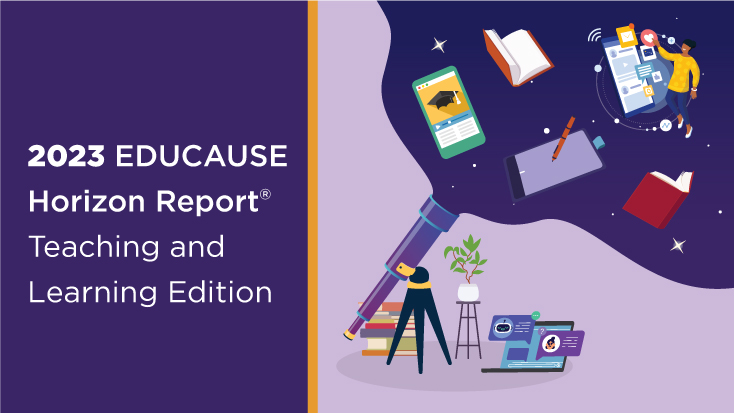Dear Commons Community,
EDUCAUSE has just published its 2023 Horizon Report – Teaching and Learning Edition. This free report profiles key trends and emerging technologies and practices shaping the future of teaching and learning, and envisions a number of scenarios and implications for that future. It is based on the perspectives and expertise of a global panel of leaders from across the higher education landscape. I had the pleasure of serving on this panel. Below is an excerpt from the Executive Summary. I draw your attention to the section on Key Technologies and Practices where artificial intelligence has captured the top two spots.
Tony
—————————————————————————————-
Executive Summary
Artificial intelligence (AI) has taken the world by storm, with new AI-powered tools such as ChatGPT opening up new opportunities in higher education for content creation, communication, and learning, while also raising new concerns about the misuses and overreach of technology. Our shared humanity has also become a key focal point within higher education, as faculty and leaders continue to wrestle with understanding and meeting the diverse needs of students and to find ways of cultivating institutional communities that support student well-being and belonging.
For this year’s teaching and learning Horizon Report, then, our panelists’ discussions oscillated between these seemingly polar ideas: the supplanting of human activity with powerful new technological capabilities, and the need for more humanity at the center of everything we do.
This report summarizes the results of those discussions and serves as one vantage point on where our future may be headed. This project was grounded in a modified Delphi methodology that seeks to elevate the collective perspectives and knowledge of a diverse group of experts, and the panelists’ activities were facilitated using tools adapted from the Institute for the Future.
Trends
As a first activity, we asked the Horizon panelists to provide input on the macro trends they believe are going to shape the future of postsecondary teaching and learning and to provide observable evidence for those trends. To ensure an expansive view of the larger trends serving as context for institutions of higher education, panelists provided input across five trend categories: social, technological, economic, environmental, and political. After several rounds of voting, the panelists selected the following trends as the most important:
Social
• Student demand for flexible and convenient learning modalities is increasing.
• The focus on equitable and inclusive teaching and learning has expanded and intensified.
• Microcredentials programs are gaining momentum and maturity.
Technological
• The potential for AI to become mainstream is growing.
• The online versus face-to-face dichotomy is being disrupted.
• Low- and no-code technologies that simplify complex processes are enabling more people to create digital content.
Economic
• Affordability and ROI are impacting potential students’ decisions to enroll in postsecondary education.
• As funding for public higher education declines, institutions are expected to do more with less.
• The need and demand for lifelong, workplace learning are increasing.
Environmental
• Climate change is increasingly impacting our daily lives.
• Environmental issues are being integrated into academic programs and institutional operations.
• Technology is behind the curve on reducing its environmental impact.
Political
• Governments are leveraging disinformation and propaganda.
• Nationalism is rising across the world.
• Political party conflict is increasingly blocking decision-making and action in the U.S. political system.
Key Technologies and Practices
Horizon panelists were asked to describe the key technologies and practices they believe will have a significant impact on the future of postsecondary teaching and learning, with a focus on those that are new or for which there appear to be substantial new developments. After several rounds of voting, the following six items rose to the top of a long list of potential technologies and practices:
• AI-Enabled Applications for Predictive, Personal Learning
• Generative AI
• Blurring the Boundaries between Learning Modalities
• HyFlex (i.e., students enrolled in a course can participate on site, synchronously online, or asynchronously online as preferred)
• Microcredentials
• Supporting Students’ Sense of Belonging and Connectedness



